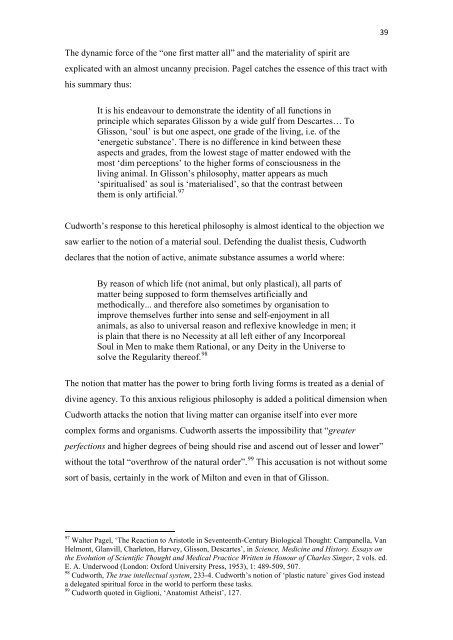Medical Science and the Anatomia Animata in Milton's Paradise Lost
Medical Science and the Anatomia Animata in Milton's Paradise Lost
Medical Science and the Anatomia Animata in Milton's Paradise Lost
You also want an ePaper? Increase the reach of your titles
YUMPU automatically turns print PDFs into web optimized ePapers that Google loves.
The dynamic force of <strong>the</strong> “one first matter all” <strong>and</strong> <strong>the</strong> materiality of spirit are<br />
explicated with an almost uncanny precision. Pagel catches <strong>the</strong> essence of this tract with<br />
his summary thus:<br />
It is his endeavour to demonstrate <strong>the</strong> identity of all functions <strong>in</strong><br />
pr<strong>in</strong>ciple which separates Glisson by a wide gulf from Descartes… To<br />
Glisson, ‘soul’ is but one aspect, one grade of <strong>the</strong> liv<strong>in</strong>g, i.e. of <strong>the</strong><br />
‘energetic substance’. There is no difference <strong>in</strong> k<strong>in</strong>d between <strong>the</strong>se<br />
aspects <strong>and</strong> grades, from <strong>the</strong> lowest stage of matter endowed with <strong>the</strong><br />
most ‘dim perceptions’ to <strong>the</strong> higher forms of consciousness <strong>in</strong> <strong>the</strong><br />
liv<strong>in</strong>g animal. In Glisson’s philosophy, matter appears as much<br />
‘spiritualised’ as soul is ‘materialised’, so that <strong>the</strong> contrast between<br />
<strong>the</strong>m is only artificial. 97<br />
Cudworth’s response to this heretical philosophy is almost identical to <strong>the</strong> objection we<br />
saw earlier to <strong>the</strong> notion of a material soul. Defend<strong>in</strong>g <strong>the</strong> dualist <strong>the</strong>sis, Cudworth<br />
declares that <strong>the</strong> notion of active, animate substance assumes a world where:<br />
By reason of which life (not animal, but only plastical), all parts of<br />
matter be<strong>in</strong>g supposed to form <strong>the</strong>mselves artificially <strong>and</strong><br />
methodically... <strong>and</strong> <strong>the</strong>refore also sometimes by organisation to<br />
improve <strong>the</strong>mselves fur<strong>the</strong>r <strong>in</strong>to sense <strong>and</strong> self-enjoyment <strong>in</strong> all<br />
animals, as also to universal reason <strong>and</strong> reflexive knowledge <strong>in</strong> men; it<br />
is pla<strong>in</strong> that <strong>the</strong>re is no Necessity at all left ei<strong>the</strong>r of any Incorporeal<br />
Soul <strong>in</strong> Men to make <strong>the</strong>m Rational, or any Deity <strong>in</strong> <strong>the</strong> Universe to<br />
solve <strong>the</strong> Regularity <strong>the</strong>reof. 98<br />
The notion that matter has <strong>the</strong> power to br<strong>in</strong>g forth liv<strong>in</strong>g forms is treated as a denial of<br />
div<strong>in</strong>e agency. To this anxious religious philosophy is added a political dimension when<br />
Cudworth attacks <strong>the</strong> notion that liv<strong>in</strong>g matter can organise itself <strong>in</strong>to ever more<br />
complex forms <strong>and</strong> organisms. Cudworth asserts <strong>the</strong> impossibility that “greater<br />
perfections <strong>and</strong> higher degrees of be<strong>in</strong>g should rise <strong>and</strong> ascend out of lesser <strong>and</strong> lower”<br />
without <strong>the</strong> total “overthrow of <strong>the</strong> natural order”. 99<br />
This accusation is not without some<br />
sort of basis, certa<strong>in</strong>ly <strong>in</strong> <strong>the</strong> work of Milton <strong>and</strong> even <strong>in</strong> that of Glisson.<br />
97 Walter Pagel, ‘The Reaction to Aristotle <strong>in</strong> Seventeenth-Century Biological Thought: Campanella, Van<br />
Helmont, Glanvill, Charleton, Harvey, Glisson, Descartes’, <strong>in</strong> <strong>Science</strong>, Medic<strong>in</strong>e <strong>and</strong> History. Essays on<br />
<strong>the</strong> Evolution of Scientific Thought <strong>and</strong> <strong>Medical</strong> Practice Written <strong>in</strong> Honour of Charles S<strong>in</strong>ger, 2 vols. ed.<br />
E. A. Underwood (London: Oxford University Press, 1953), 1: 489-509, 507.<br />
98 Cudworth, The true <strong>in</strong>tellectual system, 233-4. Cudworth’s notion of ‘plastic nature’ gives God <strong>in</strong>stead<br />
a delegated spiritual force <strong>in</strong> <strong>the</strong> world to perform <strong>the</strong>se tasks.<br />
99 Cudworth quoted <strong>in</strong> Giglioni, ‘Anatomist A<strong>the</strong>ist’, 127.<br />
39
















